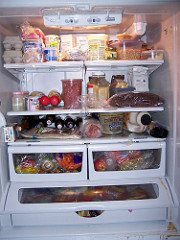What is organic coffee?
“The U.S. Department of Agriculture sets standards that must be met for a product to be labeled “organic.” In the case of coffee, producers cannot use synthetic substances such as most pesticides, herbicides and fertilizers. If coffee is labeled “organic,” at least 95 percent of the beans must have been grown under organic conditions.”
What are the environmental standards?
“The organic standard is intended to ensure the consumer that the product has no synthethic ingredients or additives, rather than showing that it was produced in an environmentally friendly way. However, the two are certainly compatible. Obviously, at one time, all farming was organic. Following those traditional practices on coffee farms today reduces the amount of herbicides, pesticides and fertilizer entering the ground, maintains partial forest canopy, reduces erosion, etc. What are the labor standards? Again, the organic standard is not aimed at improving working conditions in the coffee-producing countries, but it helps.”
www.Diabetic.Bfreesystem.com
“Pesticides used on coffee farms really don’t make it to the consumer. What little residue isn’t removed in the processing of the coffee beans is burned off by roasting. Even if you buy the cheapest coffee, made from beans that have been heavily treated, you’re probably not going to ingest any measurable pesticide residue. But the use of pesticides and herbicides is a serious health concern for the workers, and one that’s not an issue with organic coffee.”
What’s the downside?
There are costs involved, as with any of the third-party certification programs. Many small, family-owned coffee farms are organic by necessity. They can’t afford chemical pesticides and fertilizers anyway. But they also cannot afford to pay for inspections to achieve certification, and thereforecan’t earn the higher price for their beans. Also, it’s hard for even a diligent inspector to ensure that no synthetics are ever used, based on a once-a-year inspection. By regulation, coffee cannot be labeled organic unless synthetics have not been applied to that plot for atleast three years prior to the harvest that’s labeled as organic. How does the coffee I buy get certified as organic? Various non-profit organizations and for-profit companies offer certificationservices. Inspectors visit farms to confirm the standards for organic certification are being followed.”
www.DiabeticBfreesystem.com
The above article was quoted from the websites as listed, I have never known what “organic” really was.I knew it was supposed to be healthier, but it has to be more than that right? Well today you know as much as I do. I look forward to any feedback or information on this intrinsically complex subject. I hope this helped to inform as well as to educate.
Joe Tillman
www.Diabetic.Bfreesystem.com
Joe Tillman is an author and private article writer, accomplished child advocate, web site designer, marketing expert. Having an extensive background in sales and marketing. Being a father of four, born in modest means, by a modest family. At one time ten brothers and sisters counting in his immediate families. With a love for others and helping children, he tirelessly works to educate, advocate, and listen to others.
You can find him on FaceBook, MySpace,and YouTube, as well as Google. Plus many other social networking sites.
Mr. Tillman is the founder of the child advocacy group, The Child Protection Community.
You can reach him at 205-641-2726
Find More Is Organic Food Really Organic Articles

